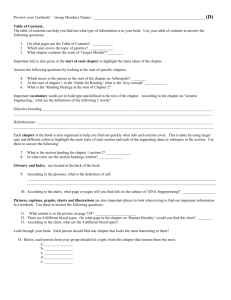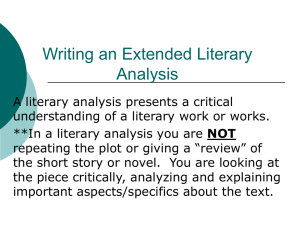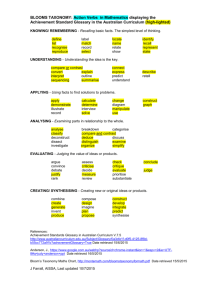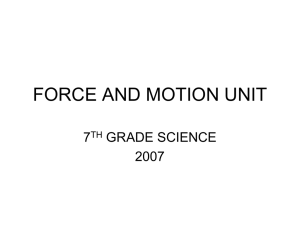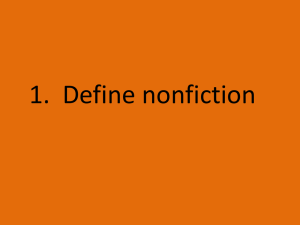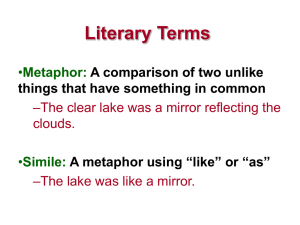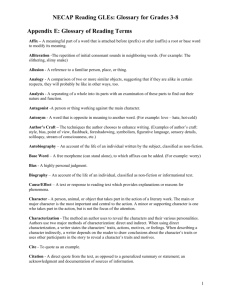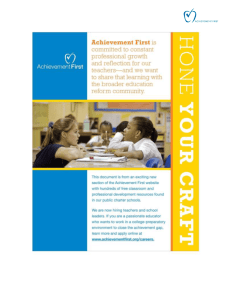Glossary - The PROE Center
advertisement
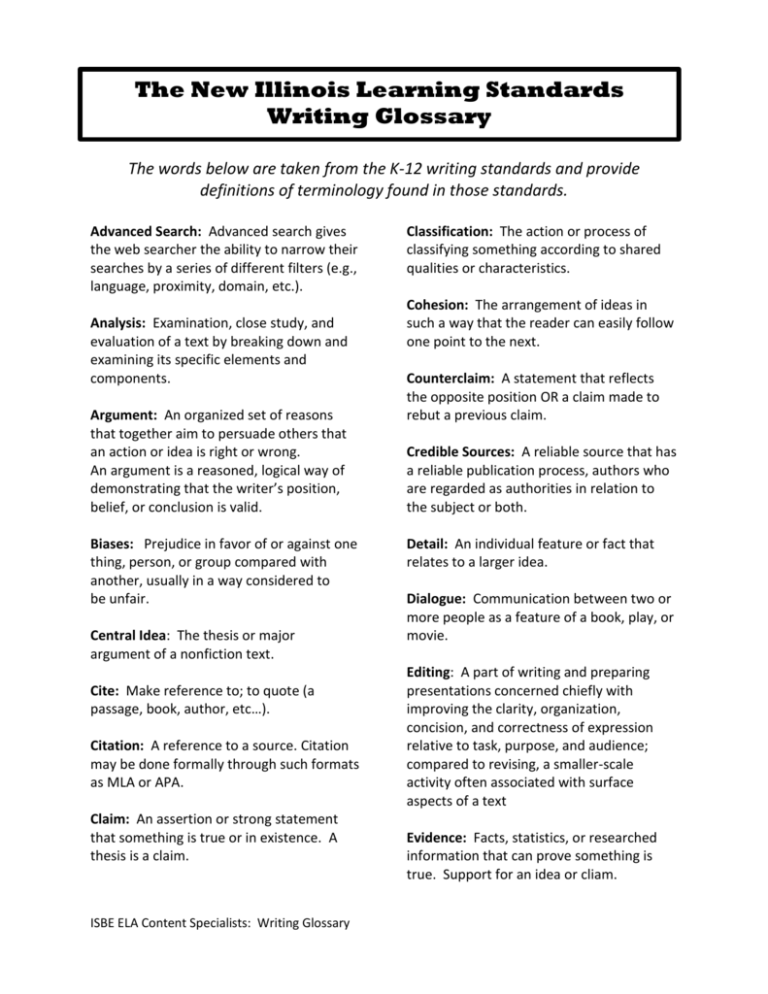
The New Illinois Learning Standards Writing Glossary The words below are taken from the K-12 writing standards and provide definitions of terminology found in those standards. Advanced Search: Advanced search gives the web searcher the ability to narrow their searches by a series of different filters (e.g., language, proximity, domain, etc.). Analysis: Examination, close study, and evaluation of a text by breaking down and examining its specific elements and components. Argument: An organized set of reasons that together aim to persuade others that an action or idea is right or wrong. An argument is a reasoned, logical way of demonstrating that the writer’s position, belief, or conclusion is valid. Biases: Prejudice in favor of or against one thing, person, or group compared with another, usually in a way considered to be unfair. Central Idea: The thesis or major argument of a nonfiction text. Cite: Make reference to; to quote (a passage, book, author, etc…). Citation: A reference to a source. Citation may be done formally through such formats as MLA or APA. Claim: An assertion or strong statement that something is true or in existence. A thesis is a claim. ISBE ELA Content Specialists: Writing Glossary Classification: The action or process of classifying something according to shared qualities or characteristics. Cohesion: The arrangement of ideas in such a way that the reader can easily follow one point to the next. Counterclaim: A statement that reflects the opposite position OR a claim made to rebut a previous claim. Credible Sources: A reliable source that has a reliable publication process, authors who are regarded as authorities in relation to the subject or both. Detail: An individual feature or fact that relates to a larger idea. Dialogue: Communication between two or more people as a feature of a book, play, or movie. Editing: A part of writing and preparing presentations concerned chiefly with improving the clarity, organization, concision, and correctness of expression relative to task, purpose, and audience; compared to revising, a smaller-scale activity often associated with surface aspects of a text Evidence: Facts, statistics, or researched information that can prove something is true. Support for an idea or cliam. Explanatory Writing: This type of writing imparts information, shares ideas and provides explanations and evidence. Opinion: A view or judgment formed about something not necessarily based on fact or knowledge. Formal Style: Style and language that is generally used in official written communication or when delivering speeches or presentations. Opposing Claim: An opposing claim is an assertion or strong statement that is in conflict or competition with another claim. Informative Writing: Educates readers by imparting straightforward information and facts. Point of View: The narrator’s position in relation to the story being told; the position from which something or someone is observed. Keyboarding Skills: To type or input text into a device. Pacing: Pacing is the tempo or speed at which something is written. Linking Words or Phrases: Linking words or phrases link ideas within sentences, across sentences and paragraphs (e.g., for, also, because, in order to, etc.). Paraphrase: To reword something written or spoken by someone else Literary Nonfiction: Literary nonfiction is a genre that uses literary styles and techniques to create factually accurate narratives (e.g., biography, travel writing, memoir, science writing, etc.). Multimedia: The integration of text, graphics, animation, sound, and/or video. Narrative: Narrative writing conveys experience, either real or imaginary, and uses time as its deep structure. It can be used for many purposes, such as to inform, instruct, persuade, or entertain. Objective Summary: To provide an account that is not influenced by personal feeling or opinions. Objective Tone: Undistorted by emotion or personal bias; seemingly neutral in considering and representing facts. ISBE ELA Content Specialists: Writing Glossary Revising: A part of writing and preparing presentations concerned chiefly with a reconsideration and reworking of the content of a text relative to task, purpose, and audience; compared to editing, a larger-scale activity often associated with the overall content and structure of a text, Plagiarism: The practice of taking someone else’s work or ideas and presenting them as one’s own. Seminal Texts: These texts are influential and important works (e.g., presidential addresses). Sensory Language: Use of details from the five senses to appeal to the reader. Short Research Project: An investigation intended to address a narrowly tailored query in a brief period of time, as in a few class periods or a week of instructional time. Summary: A brief statement or account of the main points of something. Syntax: The arrangement of words and phrases to create well-formed sentences in a language. Synthesize: Putting parts together to form a new whole. Temporal Words/Phrases: Words to describe the position of an event in time (e.g., before, after, during, between, by). Theme: The underlying meaning of a literary text. Sometimes a theme is directly stated, and sometimes it is indirectly stated. There can be more than one theme in a text (e.g., survival, love, man against nature, nature as beauty). Thesis: (The term thesis is not a part of the New Standards but may still be used in classrooms) A thesis is a statement that can be supported or proven – similar to a claim. See claim. Transitional Words: Words that connect or show the relationship between parts of a piece of writing (e.g. then, furthermore, however, after, meanwhile). Writer’s Workshop: Writer’s Workshop is a highly effective format for process writing instruction that incorporates authentic practices within a consistent structure. In such an environment, it is common for one student to be prewriting while another is drafting (and yet another may be revising). The Writer’s Workshop helps teachers oversee and support each student’s writing process while also facilitating sharing and feedback in a variety of groups. ISBE ELA Content Specialists: Writing Glossary References Definition of terms were taken from or adapted from the following sources: Core Standards: Glossary of Key Terms http://www.corestandards.org/assets/Appe ndix_A.pdf Indiana Department of Education http://www.doe.in.gov/sites/default/files/s tandards/glossary-grades-k-12-6-4-14sheet1.pdf NY Learns – Glossary http://www.nylearns.org/module/Standard s/Pages/CommonCore
